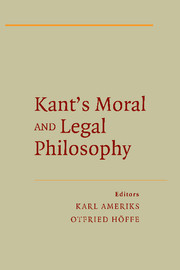Book contents
- Frontmatter
- Contents
- ACKNOWLEDGMENTS
- CONTRIBUTORS
- WORKS BY KANT
- Introduction
- I EARLY CONCEPTIONS
- II GROUNDWORK OF THE METAPHYSICS OF MORALS
- 3 What Is the Purpose of a Metaphysics of Morals? Some Observations on the Preface to the Groundwork of the Metaphysics of Morals
- 4 The Transition from Common Rational Moral Knowledge to Philosophical Rational Moral Knowledge in the Groundwork
- 5 Reason Practical in Its Own Right
- 6 Kant's Justification of the Role of Maxims in Ethics
- III CRITIQUE OF PRACTICAL REASON
- IV LEGAL AND POLITICAL PHILOSOPHY
- BIBLIOGRAPHY
- INDEX
3 - What Is the Purpose of a Metaphysics of Morals? Some Observations on the Preface to the Groundwork of the Metaphysics of Morals
Published online by Cambridge University Press: 13 November 2009
- Frontmatter
- Contents
- ACKNOWLEDGMENTS
- CONTRIBUTORS
- WORKS BY KANT
- Introduction
- I EARLY CONCEPTIONS
- II GROUNDWORK OF THE METAPHYSICS OF MORALS
- 3 What Is the Purpose of a Metaphysics of Morals? Some Observations on the Preface to the Groundwork of the Metaphysics of Morals
- 4 The Transition from Common Rational Moral Knowledge to Philosophical Rational Moral Knowledge in the Groundwork
- 5 Reason Practical in Its Own Right
- 6 Kant's Justification of the Role of Maxims in Ethics
- III CRITIQUE OF PRACTICAL REASON
- IV LEGAL AND POLITICAL PHILOSOPHY
- BIBLIOGRAPHY
- INDEX
Summary
Kant's philosophy of ethics and his doctrine of right seem to reveal a double face. On the one hand, he presents a modest and ‘minimalist’, entirely formal, theory of morals that only rules out principles of action (maxims) that cannot be willed or conceived without contradiction as universal principles valid for every rational being. On the other, he offers an extremely ambitious ultimate metaphysical grounding for all moral and juridical duties (and for the only permissible motive of complying with them) in terms of pure reason conceived independently of any specifically human attributes and characteristics. Kant's interpreters, critics, and successors have generally opted for one of these two aspects of his thought, often by assigning a different degree of weight and importance to different texts in the Kantian corpus. Thus the late work The Metaphysics of Morals is often treated as a kind of retreat from the critical self-limitation to a purely formal ethics that characterises the Groundwork of the Metaphysics of Morals. And it is sometimes even claimed that the latter text itself is difficult to reconcile with the position articulated in the Critique of Pure Reason.
But anyone attempting to elucidate the Preface to the Groundwork can hardly ignore the exceedingly strong metaphysical claim that is clearly presented there.
Keywords
- Type
- Chapter
- Information
- Kant's Moral and Legal Philosophy , pp. 77 - 92Publisher: Cambridge University PressPrint publication year: 2009
- 1
- Cited by

